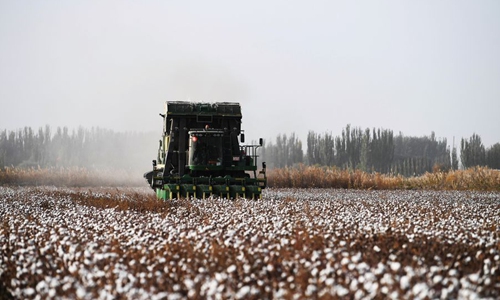China urges US to stop restrictions on Xinjiang cotton exports
Source: Global Times Published: 2020/9/15 17:15:39

A cotton harvesting machine is working in the field in Awat County, Northwest China's Xinjiang Uygur Autonomous Region, Oct. 24, 2019. (Xinhua/Sadat)
China's Foreign Ministry on Tuesday excoriated the new US restrictions on imports of cotton and apparel produced in Northwest China's Xinjiang Uygur Autonomous Region, painting US allegations of forced labor as fabrication and political manipulation and calling on Washington to stop using Xinjiang affairs to undermine China-US business cooperation.
"We urge the US to respect facts, drop prejudice, stop political manipulation and using Xinjiang affairs to undermine normal economic and trade cooperation between China and the US. China will continue to take all necessary measures to protect Chinese companies' legal rights and interests," Wang Wenbin, a spokesperson for the ministry, told a regular press briefing on Tuesday.
Citing allegations of forced labor at Xinjiang firms, the US Customs and Border Protection issued five Withhold Release Orders (WROs) to seize cotton and apparel imported from Xinjiang and it threatened to issue more.
Wang said that the US moves violate global trade rules and disrupt global industry chains. "It is naked acts of bullying. China firmly opposes this," the spokesperson said, adding that the so-called "forced labor" accusation is "completely fabricated by certain US and Western organizations and individuals and are not facts."
Some Xinjiang firms also disputed the claims as untrue and that the restrictions will not threaten their businesses.
"People come to our company through legal, normal interview process, and we hire by selecting the best of them," the owner of Xinjiang Junggar Cotton and Linen Co., Ltd surnamed Li told the Global Times on Tuesday.
The company currently has around 100 employees, Li said, all of whom are from local Xinjiang Production and Construction Corps, or Bingtuan, the local administrative unit. Li said the size of his company has remained stable over the years, and all of the staff are employed with legal official contract, with payment ranging from 3,000 ($442.3) to 8,000 yuan per month.
The company's products are crudely processed cotton, and are only sold to Chinese textile factories instead of being exported, Li said, adding that he was not aware how any of the company's products can end up being intercepted and detained at the US customs.
Li also told the Global Times that he has not been notified on the US sanction by any authority from the US or China, but does not perceive any threat such sanction poses to his company's business, since it does not directly export to the US.
RELATED ARTICLES:
Posted in: ECONOMY